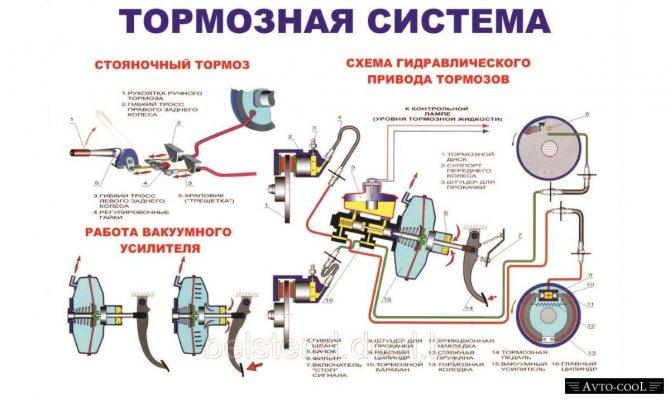
braking system. The brake pedal is too hard or soft. What can this indicate?
 The braking system is one of the most important components of any car. The failure of its components is very dangerous and can have serious consequences. An example of a failure is a brake pedal that is too hard or too soft, which reduces the effectiveness of the braking system.
The braking system is one of the most important components of any car. The failure of its components is very dangerous and can have serious consequences. An example of a failure is a brake pedal that is too hard or too soft, which reduces the effectiveness of the braking system.
When the driver presses the pedal, the pump pumps the working fluid through rigid and flexible hoses. Then it goes to the calipers, which, thanks to the pistons under pressure, press the pad against the brake disc. An important piece of the puzzle is also the so-called Brake "servo booster", which is a small device that creates an additional vacuum, which is designed to increase the braking force. Without it, even the slightest press on the brake pedal would require much more effort from us. After all, he sometimes puts up excessive resistance. What could be causing this?
“One of the reasons for the emergence of the so-called. A "hard" brake pedal may be due to old or poor-quality brake fluid. Few people remember that it is hygroscopic, that is, it absorbs water. Over time and mileage, it can accumulate quite a lot, which reduces the braking efficiency. The driver feels this because of the excessive stiffness of the brake. In addition, the presence of water causes the liquid to lose its anti-corrosion properties. This is one of the most common causes of brake hose corrosion in older vehicles, which can be very dangerous as the hose can simply break. Because of these phenomena, the brake fluid should be changed every two years or 60 km, whichever comes first,” explains Joanna Krenzelok, Director of TMD Friction Services in Poland.
Another reason is the failure of the vacuum pump, i.e. "Vacuum pumps". It is a device present in every diesel engine that drives said brake booster. In cars, two types of it are used - piston and volumetric. Failure of the vacuum pump can degrade the efficiency of the brake system and is most often caused by wear on the pump itself or engine oil leaks. Therefore, it is worth taking care of timely oil changes and the use of good quality fluids. Another cause of a stiff brake pedal can be pistons stuck in the brake calipers. Most often, this phenomenon is a consequence of the lack of proper maintenance of the brake system when replacing its components. It is also possible for the rubber plunger caps to wear out due to the accumulation of water in this area.
Read also: More and more car owners are making this mistake
Exhausted brake fluid can also have another effect, ie. make the brake pedal too soft. In extreme cases, for example, due to overheating of the system, it will simply collapse to the floor. A fluid that absorbs a lot of water has a much lower boiling point, so it is especially dangerous for dynamic driving and frequent use of the brakes. In this case, in addition to changing the fluid, it is necessary to replace the brake hoses and check other elements of this system. It is also possible that the brake fluid level is too low due to a leak. Typical faults include master cylinder leaks or flexible or rigid hose leaks. What else is worth remembering, especially in the context of the workshop?
An important service measure when replacing any components of the brake system is bleeding the system. The air remaining in the fluid reduces the braking effect, which can cause the so-called "soft brake". If bleeding a vehicle with ABS, start with the master cylinder and then follow the maintenance instructions provided for this procedure. Repeat the steps until a homogeneous fluid without air bubbles flows from the valve.
See also: How to care for the battery?
